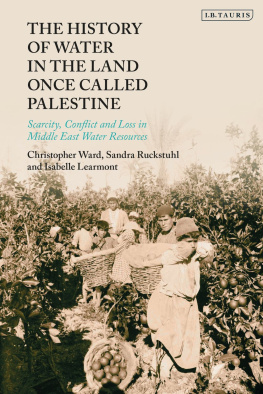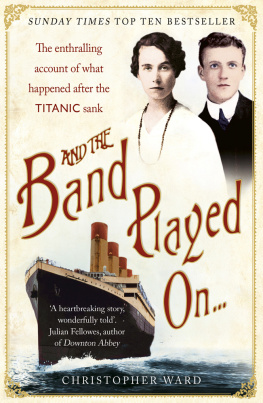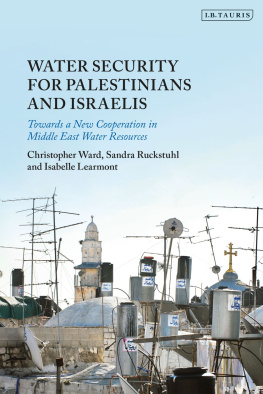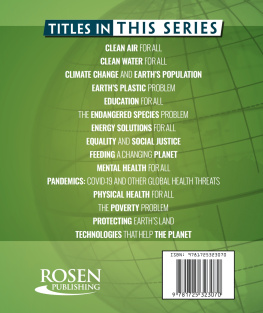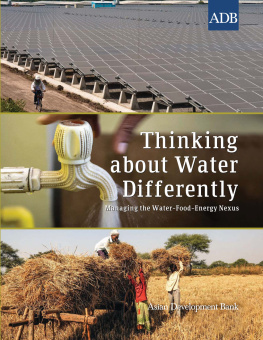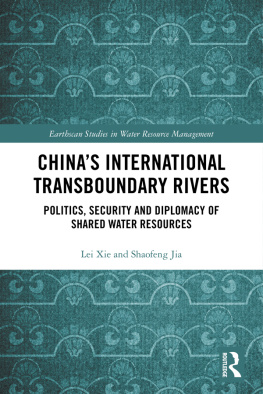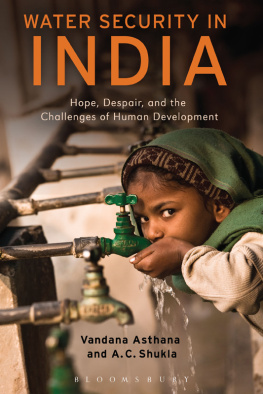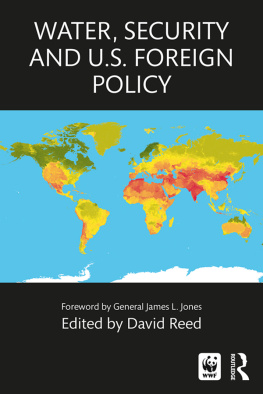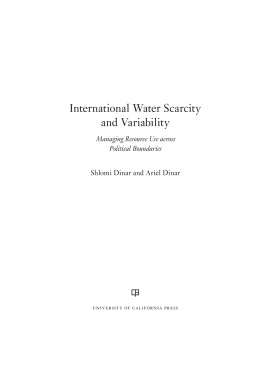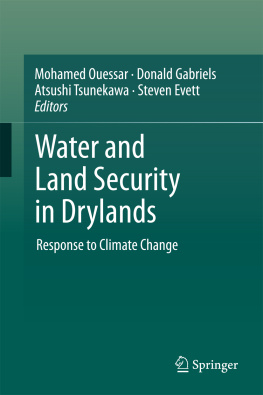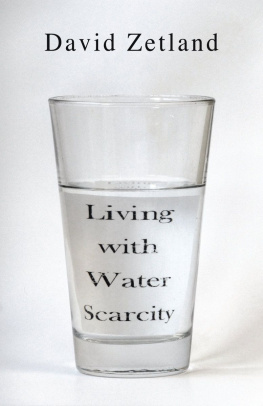The History of Water in the Land Once Called Palestine For Wolf Alexander Ward Enoch and River Emanuel Ward Enoch, and for Robert William Ruckstuhl and Mary Louise Ruckstuhl
The History of Water in the Land Once Called Palestine
Scarcity, Conflict and Loss in Middle East Water Resources
Christopher Ward
Sandra Ruckstuhl
Isabelle Learmont
Contents
The authors are entirely responsible for the content of this book, but we must mark our great appreciation of the many friends, colleagues and interlocutors who have helped us to understand the challenges or have provided invaluable information.
The very many people in the Palestinian Territories and in Israel who helped us are too numerous to mention by name, but we would like to extend our thanks to every one of them. We also acknowledge the generous cooperation of many Palestinian communities, including in Jenin, Falamyeh, Jayyous, Yatta, Aqraba and Farkha, and in Gaza City and Khan Younis.
Several experts have unstintingly supported us in various aspects of this endeavour, including Dr Mark Zeitoun, now professor at the University of East Anglia; the late and greatly missed Professor Tony Allan, the doyen of Middle East water studies at Kings and SOAS, University of London; and Dr Shimon Tal, former Water Commissioner of Israel. We also thank Professor Eugene Rogan of St Antonys College, University of Oxford; Professor Michael Cernea; and Dr Marc Valri and his colleagues and students at the Institute of Arab and Islamic Studies of the University of Exeter. We recognize too the work of Professor Ilan Papp and of Dr Seth Siegel, both of whom have illuminated the scene, albeit from different viewpoints. Our earlier inspirations were our late teachers Albert Hourani; Professor Roger Owen; Professor Freddie Beeston; Dr Robert Mabro; Professor Donald Russell; A. N. Sherwin-White; and Dr Dennis Sandole. We also pay tribute to the late and greatly regretted William St Clair, historian and humanist, whose friendship, wisdom and humour have carried us forward in this as in so many other endeavours.
Colleagues from the World Bank have been an inspiration and a support over the years, and on the subject of this book, in particular, we learned much from Salah Darghouth, Sabine Beddies, Pier Francesco Mantovani and Adnan Ghosheh. We acknowledge a great debt to the work of Jeffrey Sosland. We also recognize the excellent village study of Julia Templin, Zababdeh: A Palestinian Water History . Above all, we recognize the unstinting and excellent work of Gidon Bromberg, Nada Majdalani and Yana Abu Taleb, the directors of EcoPeace Middle East and of the former directors, who have done more than any other individuals or organization to further a just, equitable and sustainable peace in the region. Thanks too to the noble enterprise of Wikipedia, a wonderful source and source of sources. We acknowledge the sterling work of our editors, our insightful and dedicated commissioning editor David Stonestreet at I.B. Tauris, and at Bloomsbury, Tomasz Hoskins and Nayiri Kendir, and of Sophie Campbell and the excellent Bloomsbury production team. Finally, we thank Catriona Ward and Antonia Ward for their invaluable help with research and fact-checking.
Needless to say, none of these people who so generously helped us in any way endorses the content of this book, which is our responsibility alone.
This book, together with its companion volume Water Security for Palestinians and Israelis , tells the water story of the two peoples who live in the land defined by the borders of Mandate Palestine.
In this first book, The History of Water in the Land Once Called Palestine , we look at the water resource and trace the history of its development since Ottoman times up to 2020, a history characterized by a divergence between the two peoples in respect of water and its environment as strong as their divergence in other spheres.
The companion book, Water Security for Palestinians and Israelis , carries on the theme to first examine in detail the current security situations of Israelis and Palestinians in respect of water and the environment. We assess the remarkable water security the Israelis have achieved and the corresponding water insecurity and environmental vulnerability of the Palestinians. Water Security for Palestinians and Israelis then sets out the practical, economic, legal and ethical rationale for a revised cooperation on water security and the environment between the two peoples.
Christopher Ward , University of Exeter
Dr Sandra Ruckstuhl , International Water Management Institute, Colombo
Dr Isabelle Learmont , Hennock, Devon
The story of water in the land that was once called Palestine is the story of two peoples who, a hundred years ago, set out from the same common point, from the same natural endowment, the same technology, the same level of economic development, the same level of water services and who faced the same risks of drought and flood and insecurity.
It is the story of how the paths of these two peoples began to separate, first to run side by side, and then to diverge, and of how decisions and events in the larger arena started to sunder the two peoples, setting them apart and at odds with one another. Ideas, decisions and events changed the relations of power between these peoples in a profound way so that a state of enmity between them seemed to become rooted and to have an air of permanence.
A book about the history of water in the land first delineated as Palestine under the British Mandate is relevant for several reasons. One reason is memory, identity. The record of what has happened, even if it has no power to change the new reality in the future, is of value to a people self-knowledge, a realistic sense of identity defined by knowledge of what is lost and of what remains. But another reason, forward looking and more optimistic, is that knowledge and acceptance of loss can drive thoughts of what might nonetheless be different. Amongst all the facts on the ground, where is the lever that might move change? In water there may just be such a lever. One new fact on the ground is the coming of desalination. A new possibility has arisen that if we can now make water, then water need no longer be a reason for struggle. It may, instead, be part of a solution to struggle.
And an environmental window is opening, too. The Israelis have developed their natural resources to their limits. Nowadays they recognize the heavy toll taken on the environment. In their prosperity, they have the power to begin to act to correct these harms. And with this awareness and readiness for action comes the reality that their environment is shared with neighbours, and above all, with the Palestinians who live alongside them in the same land. This creates the possibility and the need for cooperation and for joint action. Along with this growing concern for the environment comes the menace of climate change, certainly bringing hotter, drier, more erratic weather and shrinking the water resource. Israelis and Palestinians are in this together, facing the same challenges. There is reasonable impulse that they should work to tackle the challenges together.
And that is the justification of both this book and its companion. If we can understand the long history of gain and loss, we can understand what may drive the parties towards a new understanding and a new compact. Israel now makes water from the sea. This relaxes the old zero-sum game. Already this has helped to bring better agreement between Jordan and Israel. The plundered and stressed environment and the reality of adverse climatic change create a logic of cooperative response.

